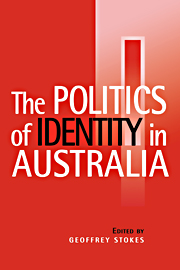Book contents
- Frontmatter
- Contents
- Acknowledgements
- Contributors
- Introduction
- Theorising Identity
- Gender and Sexuality
- Race, Place and Citizenship
- Culture: Literature and Film
- 12 Political Identity in Contemporary Australian Literature: David Malouf and Peter Carey
- 13 Australian Film and National Identity in the 1990s
- References
- Index
13 - Australian Film and National Identity in the 1990s
Published online by Cambridge University Press: 05 June 2012
- Frontmatter
- Contents
- Acknowledgements
- Contributors
- Introduction
- Theorising Identity
- Gender and Sexuality
- Race, Place and Citizenship
- Culture: Literature and Film
- 12 Political Identity in Contemporary Australian Literature: David Malouf and Peter Carey
- 13 Australian Film and National Identity in the 1990s
- References
- Index
Summary
There was a time when to talk of the Australian film industry was implicitly to endorse something called ‘national identity’. We had it, we needed to protect it, and Australian films would help: that's roughly how the discussion went. Things aren't quite so straightforward these days. Given the importance it has assumed in arguments for the establishment of the local industry and in criticism of the industry's early products, and given its brief revival in former Prime Minister Keating's Creative Nation policy statement (Australia 1994), as well as current Prime Minister John Howard's reference (1995b: 8) to the role of ‘cultural vitality’ in shaping national identity, it is worth revisiting the relationship between film and national identity. Is the issue still a relevant consideration, and if so, for whom?
Throughout the first decade of the revival, the Australian film industry was routinely assessed as a quasi-official system of representation. Its products were expected to tell ‘our’ stories to ‘our’ audiences, while also collaborating in the construction of the image of a culturally rich and diverse Australia for overseas consumption. At first, the discovery of a local audience and the occasional overseas critical success (e.g. Picnic at Hanging Rock, Sunday Too Far Away, My Brilliant Career) was enough to legitimate the establishment of the industry as a brave and progressive adventure in cultural policy. By the end of the first decade, however, the adventure seemed a little less brave and progressive; critics increasingly expressed their discomfort as the film industry seemed to have been incorporated, albeit imperfectly, into an official process of nation formation.
- Type
- Chapter
- Information
- The Politics of Identity in Australia , pp. 185 - 192Publisher: Cambridge University PressPrint publication year: 1997
- 1
- Cited by



